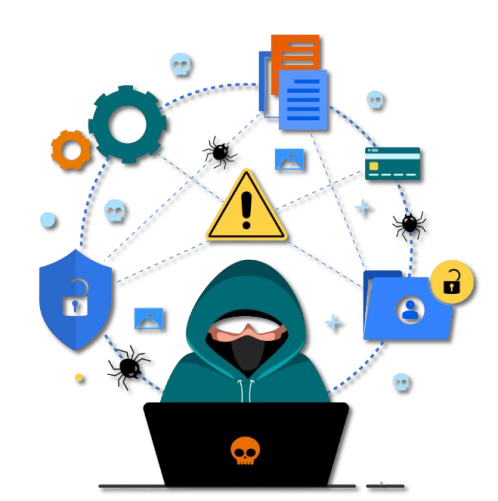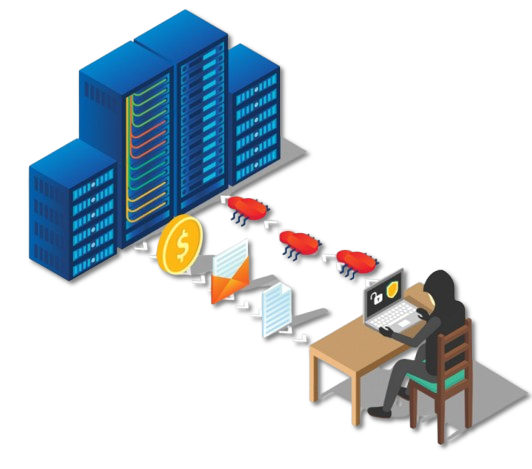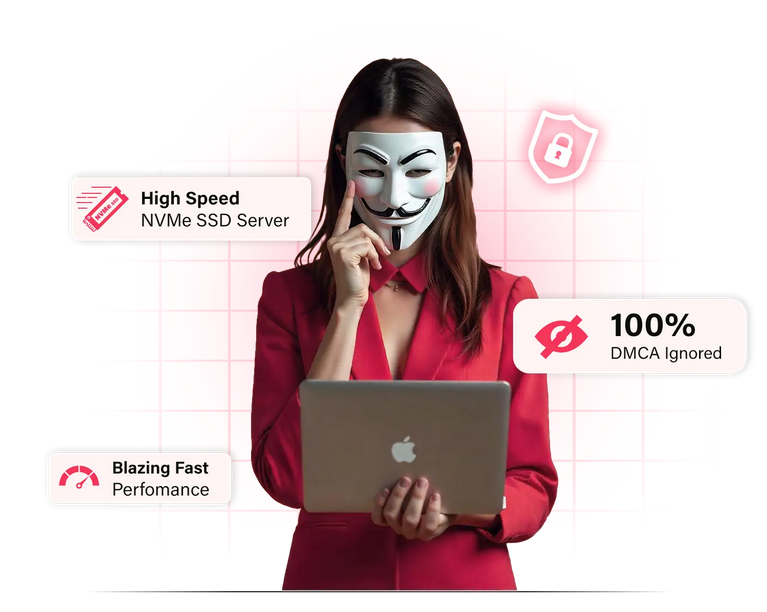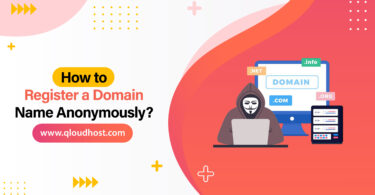Have you ever wondered how some people manage to host websites, run online projects, or even manage entire businesses, without ever revealing who they are? 🌐
In a world where every click, every login, and every data packet can be traced, online privacy has become more valuable than ever. Whether you’re a blogger, developer, activist, or simply someone who values digital freedom — the question isn’t if you should protect your online identity, but how.
That’s where Anonymous VPS hosting steps in giving you the power to operate online securely, privately, and without being tied to your personal information. As data surveillance and online censorship continue to rise, more individuals and organizations are turning toward anonymous hosting solutions to take back control of their digital space.
Here, we’ll dive deep into everything you need to know about setting up your own Anonymous VPS (Virtual Private Server) from understanding what it is, why it matters, and how it actually works, to a complete step-by-step setup guide that even beginners can follow. You’ll also learn about the best practices for staying anonymous, the common mistakes to avoid, and which provider truly offers the best anonymous VPS hosting experience in 2026.
So, if you’ve ever wanted to host your projects privately, pay using crypto without sharing your identity, or simply create a secure online environment, you’re in the right place.
Let’s start by understanding the basics 👇
What is Anonymous VPS?
Imagine having a private corner on the internet. A space where you can host your website, app, or files, without anyone knowing who’s really behind it. That’s the essence of an Anonymous VPS, or Anonymous Virtual Private Server.
Before we dive into how it works, let’s first understand what a VPS actually is and what makes it anonymous.

Understanding VPS Basics
A Virtual Private Server (VPS) is a type of web hosting that gives you dedicated resources on a virtual machine within a larger physical server.
Think of it as renting your own private apartment inside a high-rise building. While other people may live in the same building (the physical server), your apartment (your VPS) is fully yours — you control who enters, what happens inside, and how it’s managed.
Unlike shared hosting, where hundreds of users share the same environment, a VPS offers:
A VPS gives you the control of a dedicated server, without paying its high price tag.
What Makes a VPS ‘Anonymous’?
Now, a regular VPS and an anonymous VPS function the same way technically. But they differ in one major aspect: privacy.
An Anonymous VPS is designed for users who want to host or operate online without revealing their identity, personal details, or location.
Here’s how it maintains that layer of privacy:
An Anonymous VPS helps you stay online without leaving a personal trace.
Why We Need Anonymous VPS Hosting?
As the digital landscape grows, privacy and censorship have become two sides of the same coin. Many online users now realize that their data, browsing habits, and even hosted content are constantly monitored by third parties — from advertisers to government agencies.
Here’s why Anonymous VPS hosting has become a necessity in 2026:
The demand for Anonymous VPS hosting has shifted from being a “tech-enthusiast choice” to a mainstream privacy requirement.
So, now that we know what an Anonymous VPS is and why it’s so important in today’s world, let’s dive deeper into how it actually works, and what makes it so effective at protecting your online identity.
How Does Anonymous VPS Work?
Now that you understand what an Anonymous VPS is and why it matters, let’s uncover the mechanics behind it.
How does it actually keep your identity hidden?
How can a hosting provider give you full control without knowing who you are?

Let’s break it down layer by layer.
Privacy Layers Behind Anonymous VPS
An Anonymous VPS is built with several privacy-focused layers that work together to mask your identity and secure your data. These layers aren’t about magic — they’re about smart technology and privacy-first policies implemented by the provider.
Here’s what goes on behind the scenes:
Together, these layers create a protective wall around your online activities allowing you to host websites, manage projects, or store data without your real identity ever being exposed.
Key Components Involved
To understand anonymous VPS hosting fully, it’s important to look at the technical components that make it function securely and efficiently.
✔️ 1. Virtualization Technology
Anonymous VPS platforms use virtualization technologies like KVM, Xen, or OpenVZ, which allow multiple isolated virtual servers to run on a single physical server.
Each VPS acts independently, meaning no one can access or interfere with your environment — even if they’re on the same physical machine.
✔️ 2. Encrypted Data Storage
Anonymous VPS providers often use full-disk encryption or secured SSD/NVMe storage to make sure that even if the physical server is accessed, your stored data remains unreadable.
✔️ 3. Anonymous IP Address Allocation
Each VPS comes with an anonymous IP address not directly linked to your personal data.
Providers may also rotate IPs or offer private IP blocks for advanced anonymity.
✔️ 4. Secure DNS and Network Configuration
Many anonymous VPSs come with private DNS servers that prevent third parties from logging or tracking DNS queries.
Some also integrate DNS-over-HTTPS (DoH) or DNS-over-TLS for encrypted name resolution.
✔️ 5. Control Panel Access through Encrypted Channels
Anonymous VPS providers provide management panels (like Virtualizor, SolusVM, or custom dashboards) accessible via HTTPS encryption, so your credentials and actions are always transmitted securely.
✔️ 6. Offshore Data Jurisdiction
The choice of location matters a lot. Offshore regions with data protection-friendly laws ensure your content and identity remain private even if external entities request access.
An Anonymous VPS works by combining offshore infrastructure, crypto transactions, and no-log policies with strong encryption technologies, creating a hosting environment that respects your right to privacy.
You get all the advantages of a normal VPS (speed, flexibility, scalability) but without sacrificing your digital anonymity.
Now that we’ve covered how an Anonymous VPS works under the hood, it’s time to get practical.
Let’s go step-by-step through the process of setting up your own Anonymous VPS from scratch — safely, privately, and effectively.
Step-by-Step Guide to Setup Anonymous VPS
Setting up an Anonymous VPS might sound technical, but in reality, it’s a straightforward process once you understand the steps. The main goal is to set up your virtual server without revealing your identity from registration to payment to configuration.
Below is a complete step-by-step guide to help you set up your Anonymous VPS safely and efficiently.

Step 1 – Choose a Reliable Anonymous VPS Provider
The foundation of your anonymity starts with selecting the right hosting provider. Not every VPS company respects user privacy; many still require KYC, store logs, or operate in surveillance-heavy countries.
When choosing a provider, always check for the following key features:
QloudHost – Best Choice for Anonymous VPS in 2026
Among the growing number of anonymous hosting providers, QloudHost stands out as one of the most trusted and privacy-focused names in 2026.
Here’s why thousands of privacy-conscious users choose QloudHost:
If your goal is total online anonymity with professional-grade performance, QloudHost’s Anonymous VPS is one of the most reliable options you can start with.
Step 2 – Register Anonymously
Once you’ve chosen your provider, it’s time to create your account — without linking it to your personal identity.
Here’s how to do it safely:
Once registered, you’ll have access to your hosting dashboard, without ever sharing your real identity.
Step 3 – Make a Crypto Payment
After registration, the next step is to pay anonymously for your VPS plan.
Most anonymous VPS providers, including QloudHost, accept various cryptocurrencies such as Bitcoin (BTC), Ethereum (ETH), USDT, or Monero (XMR).
Here’s how to pay securely:
Once payment is confirmed, your VPS setup will begin automatically.
Step 4 – Deploy Your VPS
Now it’s time to set up your virtual server environment.
This is where your anonymous VPS comes alive — you’ll choose your operating system, configure security, and gain full control over your machine.
Choose Your Operating System (OS)
You’ll usually have several OS options like:
Choose one based on your experience and project requirements.
Access via SSH
Once deployed, you’ll receive SSH login details (IP address, username, and password).
To enhance anonymity:
Avoid Personal Identifiers
Step 5 – Secure and Configure Your Server
Your VPS is now live — but to truly stay anonymous and protected, you must harden the system.
Here’s how to do it step-by-step 👇
Update and Harden the System
Run system updates immediately after setup:
sudo apt update && sudo apt upgrade -y
This ensures all known vulnerabilities are patched. Then, disable unnecessary services and ports that you won’t use.
Set Up a Firewall
A firewall is essential for controlling which connections are allowed to your server.
Use UFW (Uncomplicated Firewall) for simple setup:
sudo ufw allow ssh
sudo ufw enable
Only open required ports (e.g., 80 for HTTP, 443 for HTTPS). Everything else should be blocked.
Enable Encryption (SSL/TLS)
If you’re hosting a website or application, use SSL/TLS certificates to encrypt data between users and your VPS.
You can install Let’s Encrypt for free certificates or use your own custom ones.
Disable Logs and Tracking
Anonymity is compromised if logs store sensitive data. Disable or limit logs using these methods:
Use a VPN or Tor for Extra Privacy
You can route your VPS traffic through a VPN tunnel or Tor network for double anonymity. This makes it nearly impossible to trace traffic back to you, even through your server IP.
Create Secure Backups (Encrypted)
Backup data using tools like Duplicity or Rclone with encryption enabled. Store backups in offshore storage or encrypted cloud services.
Once your VPS is fully configured and secured, congratulations — you’ve successfully built your own anonymous online infrastructure! 🎉
You now have full control over your digital privacy, your data, and your projects — all without revealing who you are.
Now that your VPS is set up and secured, let’s move ahead and discuss the best practices for maintaining anonymity in the long run. Even the most secure setup can be compromised if you make simple privacy mistakes.
Best Practices for Staying Anonymous
Setting up your Anonymous VPS is only half the journey, maintaining your anonymity is what truly keeps you safe in the long run.
Even the most private hosting setup can become vulnerable if small mistakes are made during daily use. From logging in with the wrong account to connecting from a traceable network, every action you take online leaves a footprint.
So, let’s explore some of the most effective and practical best practices that will help you stay truly anonymous while using your VPS.

Avoid Linking Personal Accounts
The biggest mistake many people make after setting up an Anonymous VPS is connecting it to personal services — instantly undoing all their privacy efforts.
To stay anonymous:
👉 Pro Tip: Create a dedicated encrypted folder (locally or in an encrypted USB) to store your anonymous credentials securely.
Use Encrypted Connections Always
Your VPS may be anonymous, but if your connection to it isn’t encrypted, your activity could still be intercepted.
Here’s how to ensure end-to-end encryption of all your actions:
Every connection to or from your VPS should be encrypted.
Manage Your Metadata Carefully
Even if your identity and IP are hidden, your metadata can still betray you. Metadata is the hidden information behind your files, emails, or activity timestamps, IP addresses, geolocations, and other tiny details that can identify you.
Here’s how to protect yourself:
Metadata leaks are subtle but powerful, managing them properly keeps your digital identity truly invisible.
Regularly Monitor for Leaks
Even the best setup can have vulnerabilities, and a single leak can compromise your entire anonymity chain.
That’s why routine monitoring is vital.
Here’s what to do:
Keep Software and Packages Updated
Outdated software is one of the biggest threats to anonymity and security.
Every unpatched bug is an open door for attackers — or even trackers — to identify you.
Follow this simple routine:
This ensures your server remains safe from zero-day vulnerabilities and targeted exploits.
Use Privacy-Focused Tools and Services
Enhance your VPS’s privacy with tools that are designed for anonymity:
Combining these tools creates a multi-layered privacy shield that makes it nearly impossible for anyone to trace your activity.
Backup Data Securely (Without Exposing Identity)
Data backups are essential, but they can also leak sensitive information if done carelessly.
To keep them safe:
Remember: privacy isn’t just about hiding your identity, it’s about protecting your data from any exposure.
By following these best practices, you’re not just hosting anonymously, you’re building a digital fortress of privacy.
An anonymous VPS is your first step toward true online freedom, but maintaining that freedom depends entirely on how you use and protect it.
Common Mistakes to Avoid While Setting Up Anonymous VPS
Even with all the best tools and privacy setups, a single mistake can expose your true identity online. That’s because anonymity doesn’t just depend on what hosting you choose. It also depends on how carefully you manage your digital behavior.
Here are the most common mistakes users make when setting up or managing an Anonymous VPS and how to avoid them completely.
1. Using Personal Payment Methods
This is the number one error that destroys anonymity instantly.
Many users buy an “Anonymous VPS” but end up paying with credit cards, PayPal, or bank transfers — which are directly linked to their real identities.
✅ How to Avoid:
2. Registering with Real Email or Personal Details
It might seem harmless, but signing up with your real email or contact number is enough to connect your VPS account back to you.
✅ How to Avoid:
3. Accessing the VPS Without a VPN or Tor
Accessing your anonymous VPS directly from your real IP address is a fatal mistake.
It allows the hosting provider (or any network observer) to log your real IP, even if you’re using offshore or DMCA-ignored hosting.
✅ How to Avoid:
4. Reusing Old Domains or Hosting Data
Some users reuse their old domain names, databases, or website files when moving to an anonymous VPS — not realizing those files may contain metadata, author names, or personal paths.
✅ How to Avoid:
5. Ignoring Operating System Logs
Even if your provider promises “no logs,” your server’s operating system may still record activity like SSH logins, IP addresses, or timestamps.
✅ How to Avoid:
6. Not Encrypting Sensitive Files
Hosting your files or backups without encryption makes them easy targets if your VPS is ever compromised.
✅ How to Avoid:
7. Overlooking DNS Leaks
Even if your IP is hidden, your DNS requests can still reveal your true location or ISP. This happens when your system uses your local ISP’s DNS instead of private or encrypted ones.
✅ How to Avoid:
8. Using Free or Unreliable VPNs
Many users think they’re anonymous because they use a VPN — but free or poorly configured VPNs can log everything and even sell your data.
✅ How to Avoid:
9. Mixing Personal and Anonymous Identities
Using the same browser, laptop, or even writing style between your personal and anonymous activities can connect the dots.
✅ How to Avoid:
10. Ignoring Regular Security Audits
Even after setup, failing to monitor your server’s health and security is one of the biggest mistakes.
Attackers or trackers can exploit unnoticed vulnerabilities.
✅ How to Avoid:
Your anonymity isn’t defined by your hosting provider, it’s defined by your discipline.
Avoiding these mistakes keeps your Anonymous VPS setup airtight and ensures your digital identity remains invisible, even in the most monitored environments.
Benefits of Using an Anonymous VPS
Using an Anonymous VPS isn’t just about hiding your identity, it’s about regaining control of your digital freedom.
Where online surveillance, censorship, and data tracking are at their peak, having an environment that truly respects your privacy has become essential.
Whether you’re hosting a blog, managing files, or running a business, an Anonymous VPS gives you all the power of a traditional VPS, but with total privacy and independence.
Let’s explore the major benefits that make Anonymous VPS hosting a preferred choice for privacy-focused users worldwide.
1. Complete Online Privacy
One of the biggest advantages of an Anonymous VPS is the total privacy it provides.
Your hosting account, payments, and IP usage are completely detached from your personal identity.
How It Protects You:
An Anonymous VPS allows you to exist online without being visible. A digital invisibility cloak for your projects.
2. Protection from Censorship
Censorship is becoming a global issue. Whether it’s government restrictions, ISP blocks, or platform takedowns, freedom of expression is shrinking day by day.
With an Anonymous VPS, you can host your content in DMCA-ignored or censorship-free locations that value digital independence.
Why This Matters:
Offshore hosting locations like the Netherlands or Iceland ensure that your voice remains online, even if local regulations try to silence it.
3. Secure Data Hosting
Unlike shared hosting or centralized cloud services, Anonymous VPS hosting gives you full control over your environment and data.
That means no one else, not even your hosting provider can peek into your stored files.
Security Features Include:
With these layers in place, your files, communications, and digital activities remain locked down from prying eyes.
4. Anonymous Payments & Financial Independence
Financial privacy is a core part of online anonymity. Anonymous VPS providers allow you to pay using cryptocurrencies such as Bitcoin, Litecoin, or Monero, ensuring that your personal bank details are never shared.
Why This Is a Game-Changer:
In the modern world, financial privacy is digital power — and anonymous VPS hosting gives you exactly that.
5. Global Accessibility
With offshore servers located around the world, anonymous VPS providers offer global accessibility and geographical flexibility.
You can choose a server location close to your audience while still protecting your privacy.
Advantages:
Whether your visitors are in Asia, Europe, or the Americas you can stay private and deliver content fast.
6. Full Control Over Server Environment
Unlike shared hosting, where your configuration options are limited, an Anonymous VPS gives you root access — the highest level of administrative control.
You Can:
This level of control empowers advanced users, developers, and digital entrepreneurs to shape their environment however they want completely anonymously.
7. Freedom from DMCA Restrictions
This is a major benefit that separates Anonymous VPS from regular hosting. Many anonymous or offshore providers operate from DMCA-ignored jurisdictions, meaning they don’t comply with U.S. copyright takedown requests.
What This Means for You:
If you’re hosting freedom-driven projects or platforms that often face copyright complaints, a DMCA-ignored VPS is the safest option.
8. Enhanced Security Against Tracking & Attacks
Since anonymous VPS providers use offshore servers and independent IP pools, you’re better protected from network surveillance, hacking attempts, and DDoS attacks.
Additional Security Benefits:
These features make anonymous VPS hosting not only private but also highly secure and stable.
9. No Geographic or Legal Boundaries
Because anonymous VPS providers operate from independent jurisdictions, your hosting is not tied to your country’s surveillance or legal structure.
You’re free to:
This is why digital entrepreneurs, journalists, activists, and crypto developers prefer anonymous VPS setups, they enable true borderless operations.
10. Ideal for Developers, Entrepreneurs, and Privacy Enthusiasts
Anonymous VPS isn’t just for whistleblowers or advanced users, it’s for anyone who values privacy.
Whether you’re launching a SaaS app, testing blockchain nodes, or running a small business, having full control and anonymity gives you security, independence, and flexibility.
Simply put an Anonymous VPS isn’t just about staying hidden; it’s about staying free.
Best Anonymous VPS Hosting Provider in 2026
When it comes to choosing the best Anonymous VPS hosting provider, the internet is full of options. But not every provider that claims to offer privacy truly does. Many still log user data, request verification documents, or operate under jurisdictions that don’t respect online anonymity.
That’s why you need a provider that’s built from the ground up for privacy, offshore hosting, and freedom — and that’s where QloudHost stands out.

Why QloudHost is the Best Anonymous VPS Provider
QloudHost has positioned itself as one of the most trusted names in the anonymous hosting industry, offering users complete anonymity, offshore infrastructure, and DMCA-ignored protection. All while maintaining blazing-fast performance and reliability.
Let’s explore what makes QloudHost the top choice for Anonymous VPS in 2026 👇
1. Offshore Server Locations for Ultimate Privacy
QloudHost operates servers in offshore and privacy-friendly countries like the Netherlands and beyond. These regions are well-known for their strong data protection laws and non-cooperation with DMCA or surveillance agencies.
This means your content and identity remain safe, even under external pressure.
2. 100% DMCA-Ignored Hosting
QloudHost’s infrastructure is DMCA-ignored by design, meaning your websites, platforms, or projects will never face takedowns for DMCA complaints.
It’s the perfect solution for:
3. Anonymous Sign-Up & No Personal Verification
You don’t need to share your name, address, or ID to register. QloudHost allows anonymous registration, requiring only a basic email to set up your VPS, giving you complete identity protection.
4. Crypto Payment Support
QloudHost accepts cryptocurrency payments, including Bitcoin, Ethereum, and other popular coins, ensuring 100% financial anonymity.
No banking details or KYC checks — just a quick, private transaction.
Financial freedom meets hosting freedom.
5. Full Root Access & Scalability
You get full root control over your VPS environment with complete flexibility to install any software, framework, or OS version you prefer. And when your project grows, QloudHost allows easy scaling of resources, without losing your privacy.
6. Ultra-Fast & Secure Infrastructure
QloudHost’s VPS solutions are powered by NVMe SSD storage, advanced DDoS protection, and high-speed offshore networks. This ensures low latency, superior uptime, and excellent security for your anonymous projects.
7. Strict No-Logs Policy
QloudHost follows a zero-log policy, meaning it doesn’t record your activities, IPs, or timestamps. Even if someone requests user data, there’s simply nothing to share.
8. 24/7 Private Support
Unlike most offshore providers that ignore customer service, QloudHost provides round-the-clock support, ensuring your anonymous VPS stays stable and secure at all times.
If you’re serious about privacy, freedom, and true digital independence — QloudHost is your best Anonymous VPS provider in 2026.
It combines everything a privacy-conscious user needs:
You can explore their plans here: QloudHost – Best Anonymous VPS Hosting
For those, who interested in VPS options beyond Debian, our article on best Debian VPS Hosting providers in Netherlands offers a detailed comparison of top providers, features, and pricing, perfect for making an informed hosting decision.
If you’ve confirmed your internet is working, but a specific website still looks broken, won’t load properly, or shows you outdated information, the culprit is almost always your browser’s cache. Your browser is likely holding onto an old, “stale” version of the site’s files. Forcing it to download a fresh copy is the next logical step. We have a complete, step-by-step guide on how to clear the Safari browser cache on your Mac that will walk you through the correct and safest way to do it.
Want to keep your browsing private while exploring the web? Don’t miss our complete guide on how to open Incognito Mode in Opera Browser, where we’ve explained every step to browse safely and securely across devices. It’s a must-read for anyone who values online privacy.
Choosing the right server CPU can dramatically impact your website’s speed, stability, and scalability. Learn more about the latest Intel Xeon and AMD EPYC processors in our comprehensive article on Intel vs AMD, where we cover full comparisons, performance benchmarks, and recommendations for modern web hosting setups.
For users who want complete privacy from the moment they buy a domain, we recommend checking out our detailed guide on registering a domain name anonymously. It covers every step, from choosing a secure anonymous domain provider to using WHOIS protection and crypto payments. This guide will help you stay fully anonymous and avoid exposing your real details anywhere online.
When prioritizing online privacy and freedom from DMCA takedowns, choosing the right registrar is just as important as selecting an anonymous hosting provider. For readers looking to pair secure hosting with optimal domain protection, our comprehensive article on Best Offshore Domain Registrars walks through top offshore registrars, pricing, privacy features, and why these services matter for anyone building a private, resilient online presence.
Not every hosting provider is suitable for regulated or high-risk industries like vaping. If you’re planning to launch or move a vape store, it’s worth checking this comparison of the best web hosting for vape stores, where you’ll find vape-friendly hosts, offshore options, pricing comparisons, and expert tips on selecting a reliable hosting provider for long-term growth.
FAQs – How to Setup Anonymous VPS?
Let’s answer some of the most common questions people ask about setting up and managing an anonymous VPS 👇
1. What is an Anonymous VPS?
An Anonymous VPS is a Virtual Private Server that allows you to host websites, applications, or data without revealing your personal identity. It uses offshore servers, anonymous sign-up, and crypto payments to keep your activities private and untraceable.
2. Is Anonymous VPS Legal?
Yes, absolutely — using an Anonymous VPS is legal in most countries. It becomes problematic only if it’s used for illegal purposes (like hacking or fraud). If your goal is privacy, freedom of expression, or secure hosting — you’re completely within legal boundaries.
3. How Can I Pay for Anonymous VPS Without Revealing My Identity?
The safest way is to use cryptocurrency payments. You can pay using Bitcoin, Ethereum, or privacy coins like Monero. Avoid traditional methods like PayPal or credit cards since they link directly to your personal identity.
4. Can I Host Adult or Streaming Websites on Anonymous VPS?
Yes — that’s one of the major reasons users choose Anonymous VPS hosting. With DMCA-ignored offshore hosting like QloudHost, you can host adult sites, streaming platforms, or freedom-based content without takedown worries.
5. How Do I Stay Fully Anonymous After Setting Up My VPS?
To maintain complete anonymity:
-> Use a VPN or Tor when accessing your VPS.
-> Avoid reusing personal domains or emails.
-> Pay only via crypto.
-> Regularly delete logs and encrypt files.
-> Never mix personal and anonymous online activities.
6. What’s the Difference Between Anonymous VPS and Regular VPS?
A regular VPS requires identity verification, uses onshore servers, and stores activity logs.
An Anonymous VPS, on the other hand, provides:
-> Offshore hosting
-> Anonymous registration
-> Crypto payments
-> No logs or personal data storage
It’s the same technology — but with privacy-first execution.
7. Why is QloudHost the Best Choice for Anonymous VPS?
Because QloudHost is one of the few providers that offers 100% DMCA Ignored Hosting, offshore data centers, anonymous sign-up, and crypto payment options — all in one platform. Their privacy-first infrastructure, combined with fast NVMe SSD performance, makes them a trusted global choice for anonymous hosting in 2026.
Conclusion – How to Setup Anonymous VPS?
In today’s hyper-surveilled technical and digital age, privacy isn’t just a luxury, it’s a necessity. Setting up an Anonymous VPS empowers you to protect your identity, your data, and your freedom online.
From anonymous registration and crypto payments to offshore servers and DMCA-ignored hosting, every step you take builds a stronger wall between your online presence and your real-world identity.
But the key lies in choosing the right provider, one that respects your privacy and supports your goals without compromise.
That’s why QloudHost stands as the best choice in 2026, offering unmatched anonymity, high-speed offshore performance, and total freedom from censorship.
So, if you truly value digital independence, it’s time to take the next step —
Setup your Anonymous VPS with QloudHost today and reclaim your online privacy.


![IPTV GitHub Playlist 8000 Worldwide [current_date format='Y, M'] - [M3U Playlist for Free] IPTV GitHub Playlist](https://qloudhost.com/blog/wp-content/uploads/2025/02/IPTV-GitHub-Playlist-375x195.jpg)
![How to Start an IPTV Website In [current_date format='Y']? Step-by-Step Guide How to Start an IPTV Website](https://qloudhost.com/blog/wp-content/uploads/2026/02/How-to-Start-an-IPTV-Website-375x195.jpg)

Leave a Comment